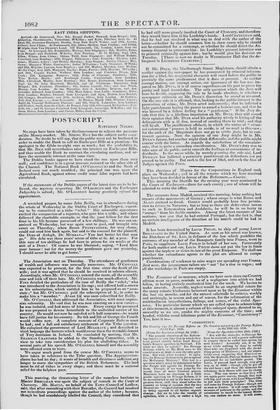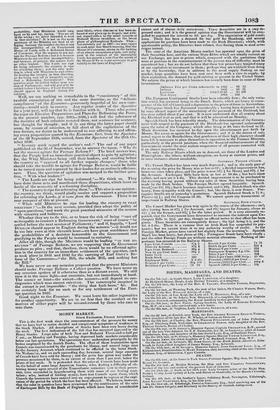The Examiner of to-morrow, which we have seen since ourCountry
edition went to press, reminds us of a negligence into which we had fallen, in having entirely overlooked him for the week. We hasten to make amends. Assuredly, neglect would be an ungrateful return for the many minute kindnesses bestowed upon us by the Examiner within the last six months, and for the earnest solicitude he evinces, weekly and untiringly, in season and out of season, for the reformation of the multitudinous imperfections, failings, and errors, of the sinful Spec- tator. The particular favour which we are called upon to acknowledge at this moment, is almost a column of his enlarged space, devoted to us, unworthy as we are, amidst the mighty concerns of the time ; and headed, with the usual felicitous point of the Examiner, "Consistency !" Yes, here it is—
"CONSISTENCY.
The Country not yet ripe for Peerage Reform on the 291h Vet. 1836.
[From the Spectator of Oct. 29th, 1836.] •• But will the obstacles to Peerage Re- form be removed, or will a blower sufficient to remove them be called into action, by next Easter ? Assuredly not, if in the mean while nothing be done to satisfy those who are disgusted with the do-no- thing policy of Ministers ; and not impro- bably, even supposing that Ministers sa- tisfy the Radicals, Peerage Reform may be postponed for an indefinite period. The Lords, if pressed hard enough, may give way. as in 1832 — though tally to pat off the evil hour ; and then ttilt -stimulus for reforming their House will lose its sharp- ness. Who can insure us that they will not again prove craven, though they now talk big, and swear, with Lord Wharncliffe, to fall with their principles ? The time will come for Peerage Reform—though not so soon as Easter. It will come when the measure of patience in the public, and the submission to insult in the tamest Minis- try, can endure no more. It will come. The Country ripe Ar Pm rage Reform on the 3d Sept. 1836.
[ From the Spectator of Sept. 3d, 1336.] • "flat present situation of the Reform- ing masses is very like that in which they were piaced shortly before Lord Broug. ham's famous speeches in Scotland. For what are they to agitate ? For Peerage Reffirtn, ultich, as Mr. Hutt says to his constituent s at II till, is now the only ques- tion. But shit what leaders? Is agile.. lion for Peerage Reform to befor or against the Melbourne Ministry ? his last is a question which must be determined before the People will agitate for Peerage Re• form. Though. if' we may judge by the recent tone of some Treasury papers, Ministers have no objection to a little gentle agitation for Peerage Reform, if it be so conducted as not in the least to com- promise them, still they stand before the country as being of opinion that the two 'louses are • coequal and coordinate,' and as being opposed to all further organic change. Are we to take the trouble of agitation, with a risk, or rather a high probability, that Ministers %mild turn most likely, when discussion has been n- aval us by and by, saying, 'You are all hassled and given up it* despair, and with- in the wrong ; we never intended to lead out regard either to the small conceits of 4n that direction It is not as the mere Holland House twaddlers, or the broad partisans of the Ministry are food of al. plans of philosophical Radicals. Then- leging. because the country doubts at out tint certainly not in 1837-we may expect the iccompatibilit y of an Unreformed to read, some fine March morning, that the House of 1 ordi with a Reformed House House of Commons, strong in the backing of Commons, that the masses to not agi. of an almost unanimous iwople, and indig- tate for Peerage Reform ; but it is because nant at the conduct of the incorrigible Ministers do not see that incompatibility, lords, has passed a vote that the assent of and because, at present. the masses have the House of Pe rs is not necessary to give no other leaders. The Lords are ripe validity to the laws of England."
for being reformed ; the country is ripe
for reforming them ; and the only ques-
tion is, when will Ministers be ripe Mu.: for leading the country in that direction, or for being cast off as incapable to eofl. duct a Ryforming Government ? This
question must be settled ',cline next ses-
sion of Parliament ; tind will proliatily be settled before Christmas, if Lord Durham should appear in England during the autumn."
Well, we see nothing so remarkable in the "consistency" of this
twofold enunciation of one and the same doctrine, as the "delicate compliment" of the Examiner—generouslyforgetful of his own supe- riority—would wish to convey. Any regular reader of the Spectator for a year past, will say that he is familiar with it. Those who peruse the topic on Election Preparations and Plans for Reforming the Peers, in the present number, (pp. 1085-10860 will find the substance of the doctrine of both columns restated there, not sentence for sentence, but thought for thought : and if in any thing the latter paper should
seem, by reason of omission, to fall short of the explicitness of the two former, we desire to be understood as now adhering to and affirm- ing every proposition quoted by the Examiner, first, from the Spectator of the 3d September 1836, second, from the Spectator of the 29th Oc- tober 1836.
" In every work regard the author's end :" The end of our paper published on the 3d of September, was to answer the taunt, "Why do not the masses agitate for Peerage Reform ? " The brief answer was, that the People had no immediate practical object to gain by agitation ; for, the Whig Ministers being still their leaders, and standing before the country as " opposed to all further organic changes," those who should take the trouble to agitate for Peerage Reform, would be liable to be turned upon and reproved by their leaders for an untimely officious. ness. Thus, the question of agitation was merged in the further ques-
,tion, " With what leaders ?"
" The Lords are ripe for being reformed."—We think so. They bare done those acts, and manifested those dispositions, which leave no doubt of the necessity of a reforming discipline. " The country is ripe for reforming them."—This also is our opinion : the country, we think, would gladly receive and support a proposition for reforming the Lords, if it came from the Government. There is no near prospect of this at present.
" When will Ministers be ripe for leading the country IN THAT DIRECTION? "—In the next session, provided they adopt the policy of "open questions," and work the great practical measures of the session
with sincerity and boldness. Whether they are to do this, or to brave the risk of being "cast off
as incapable to conduct a Reforming Government," must of course "be settled before the next session of Parliament ; " and if, happily, "Lord DURHAM should appear in England during the autumn "—it would not be too late even at this eleventh hour—we have great confidence that the probabilities of a decision honourable to the Government and
gratifying to the People would be increased to certainty.
After all this, though the Ministers would be leading "IN THE DI- RECTION " of Peerage Reform, we are supposing that the Government produces no plan, and that, therfore, there would be no effectual agita- tion in the country for an immediate settlement of the que3tion, such as took place in 1831 and 1832 for the carrying of Earl GREY'S Re- form of the Commons—" the Bill, the whole Bill, and nothing but
the Bill."
We have never on any occasion proposed that the present Ministers should make Peerage Reform a Cabinet question. We have never on any occasion spoken of it otherwise than as a distant event. We still view it in the same light—not uncertain, but not immediately at hand. The sooner or later—the extent—the manner—will depend on con- tingencies which man cannot calculate. The catastrophe imagined in the extract is not impossible: "the thing that bath been," 8:c. But we certainly look for no such or for any settlement of the Peer-
age question in 1837. Good night to the Examiner. We must leave his other ingenuities
for another opportunity. We are in no fear that the conduct or the motives of either paper will be misunderstood by those who care to scan them.



























 Previous page
Previous page